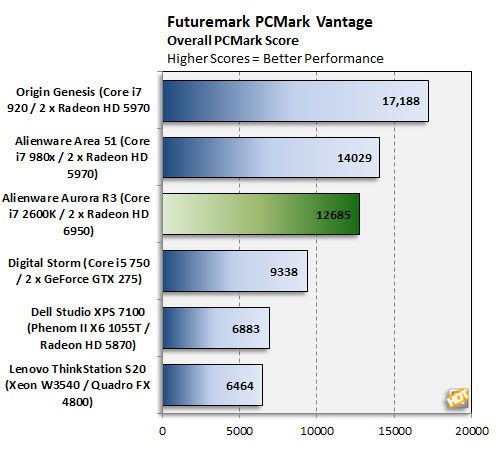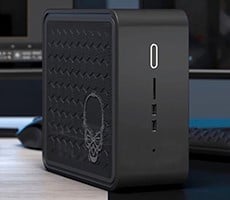Alienware Aurora R3 System Autopsy
|
|
|

In our PCMark Vantage test, the Aurora R3 kept pace with an Alienware Area 51 system equipped with Intel's mighty Core i7 980X Extreme Edition processor and two Radeon HD 5970 graphics cards. So why couldn't it keep up with the Origin Genesis? As configured, the Aurora R3 lacks a solid state drive and sports just 4GB of lower frequency DDR3-1333 memory, both of which prevent the system from reaching its full potential, whereas the Origin system has the benefit of an 80GB SSD and 6GB of fast DDR3-1600 memory. It's worth mentioning that Dell offers faster storage and RAM options on the Aurora R3.
|
|
|
The latest version of Futuremark's synthetic 3D gaming benchmark, 3DMark11, is specifically bound to Windows Vista and 7-based systems because it uses the advanced visual technologies that are only available with DirectX 11, which isn't available on previous versions of Windows. 3DMark11 isn't simply a port of 3DMark Vantage to DirectX 11, though. With this latest version of the benchmark, Futuremark has incorporated four new graphics tests, a physics tests, and a new combined test. We tested the graphics cards here with 3DMark11's Performance preset option, as well as ran the system through a 3DMark Vantage run, which focuses on DirectX 10.

There are a couple of things to note here. First, the Aurora's 7099 score in 3DMark 11 is a respectable score in its own right, and certainly a good clip higher than what you'll achieve with most single-GPU setups. Secondly, welcome to the world of model numbers. At a glance, you'd think a pair of Radeon HD 6950 graphics cards would destroy two Radeon HD 5970 parts or a GTX 580. But in reality, the 6950 is a weaker than either of those. The 5970 actually sports two GPUs per card, and each one has more shader units than the 6950, while the GTX 580 is just a burlier architecture all around. This is the reason why the Aurora R3 trails some of the other higher end gaming machines we've reviewed.

The same concepts apply to 3DMark Vantage, only we have a much larger sample of rigs to compare with since it's an older benchmark. Again, a score of 21,776 is nothing to sneeze at, but the 6950 graphics cards just don't have the muscle to pull the Aurora R3 up to the same level as other gaming machines with higher end GPUs. We should also note that NVIDIA's PhysX technology skews the results a bit in favor of the NVIDIA's based systems as well in this test.







